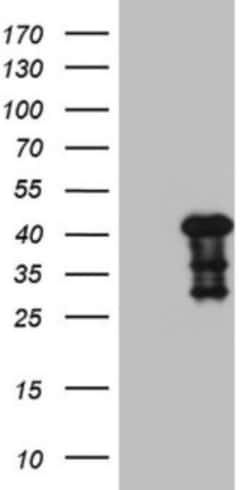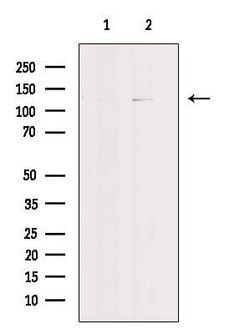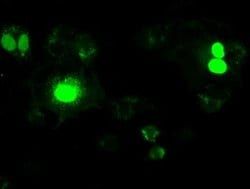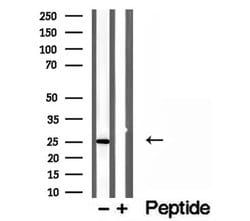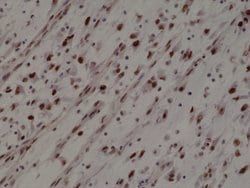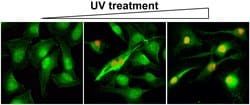MYOD Recombinant Rabbit Monoclonal Antibody (RM369), Invitrogen™
Manufacturer: Thermo Scientific
Select a Size
| Pack Size | SKU | Availability | Price |
|---|---|---|---|
| Each of 1 | PIMA533061-Each-of-1 | In Stock | ₹ 47,036.50 |
PIMA533061 - Each of 1
In Stock
Quantity
1
Base Price: ₹ 47,036.50
GST (18%): ₹ 8,466.57
Total Price: ₹ 55,503.07
Antigen
MYOD
Classification
Recombinant Monoclonal
Concentration
0.1 mg/mL
Formulation
PBS with 1% BSA, 50% glycerol and 0.09% sodium azide
Gene Accession No.
P10085, P15172, Q02346
Gene Symbols
MYOD1
Immunogen
A peptide corresponding to residues near the N-terminus of human MyoD1 (Myoblast determination protein 1).
Quantity
100 μL
Primary or Secondary
Primary
Target Species
Human, Mouse, Rat
Product Type
Antibody
Isotype
IgG
Applications
Immunohistochemistry (Paraffin), Western Blot
Clone
RM369
Conjugate
Unconjugated
Gene
MYOD1
Gene Alias
AI503393, bHLHc1, Class C basic helix-loop-helix protein 1, CMD1, MYF3, Myf-3, Myoblast determination protein 1, myoblast determination protein 1 homolog, Myod, MYOD1, Myod-1, MYOD1 homolog, myogenic differentiation 1, myogenic factor 1, myogenic factor 3, PUM, unnamed protein product
Host Species
Rabbit
Purification Method
Protein A
Regulatory Status
RUO
Gene ID (Entrez)
17927, 337868, 4654
Content And Storage
-20°C
Form
Liquid
Description
- Specificity: reacts to human, mouse, and rat MyoD1 (Myoblast determination protein 1)
- Recombinant rabbit monoclonal antibodies are produced using in vitro expression systems
- The expression systems are developed by cloning in the specific antibody DNA sequences from immunoreactive rabbits
- Then, individual clones are screened to select the best candidates for production
- The advantages of using recombinant rabbit monoclonal antibodies include: better specificity and sensitivity, lot-to-lot consistency, animal origin-free formulations, and broader immunoreactivity to diverse targets due to larger rabbit immune repertoire
- The Myogenic determination gene (MyoD) was first identified by the virtue of its ability to convert embryonic mouse fibroblast cells to muscle cells
- It was subsequently shown that forced expression of MyoD (human homolog is myf 3) gene in a wide variety of normal and neoplastic cells could either convert the cells to muscle cells or activate a set of the otherwise transcriptionally inactive muscle-specific genes in these cells
- The regulatory domain of the MyoD gene product lies within a 70 amino acid region and comprises a basic DNA binding motif and a helix-loop-helix (HLH) dimerization motif
- Subsequent studies identified three other genes whose products shared sequence homology for the basic HLH domain of MyoD
- These are; myf5, myogenin (human homolog is myf4) and myf6 (also known as MRF4 and herculin).
